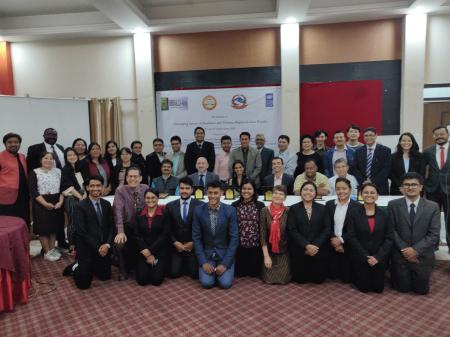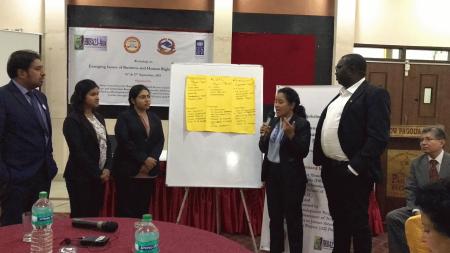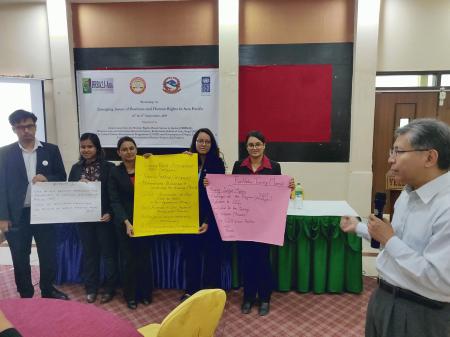- TOP
- 国際人権基準の動向
- FOCUS
- September 2019 - Volume 97
- Emerging Issues on Business and Human Rights in the Asia-Pacific
FOCUS September 2019 Volume 97
Emerging Issues on Business and Human Rights in the Asia-Pacific
A two-day workshop on emerging issues regarding business and human rights in Asia-Pacific was held in Kathmandu on 16 -17 September 2019. Representatives of non-governmental organizations, bar associations, and law schools from Nepal, Malaysia, Myanmar, Pakistan, the Philippines, Japan, Thailand, India, Laos, Nigeria and United Nations agencies based in Nepal and Thailand attended the workshop.
It was also an access to justice event of the 9th Asia Pro Bono Conference, held in Kathmandu (13-15 September 2019).
Opening Ceremonies
Jefferson R. Plantilla, Chief Researcher of the Asia-Pacific Human Rights Information Center based in Osaka, explained the initiative taken by the Asian Consortium for Human Rights-Based Access to Justice (HRBA2J-Asia) on business and human rights, particularly by its Northeast Asian members, that led to the holding of the workshop. He also stressed the fact that issues of access to justice and business have long been part of the agenda of the civil society way back in the 1980s in addressing development issues affecting the poor and the marginalized in Asia and the Pacific. He expressed the hope that the introduction of the business and human rights framework would help resolve these long-standing issues.
Professor Yubaraj Sangroula, founder and Dean of the Kathmandu School of Law, in his opening remarks emphasized the need for access to justice especially for the poor and the marginalized. He emphasized that denial of access to resources created problems in the livelihood of people. This is illustrated in the disparity of life between those who work for big companies and people in the slum area. He noted that only 10 percent of the entire population, especially in South Asia, enjoy proper protection of human rights. He therefore observed that the notion of inclusiveness in a democratic government had not contributed to the welfare of the people. Priority should be given to those living in rural villages. More capability-building measures should be undertaken to enable them to enjoy their human rights instead of simply giving them food, for instance. While the corporate sector had provided revenue to the state, its self-interest could not be curtailed and had caused adverse effect on human rights. He further added that economy, development and human rights should be reconciled and examined as a right of an individual. He ended by saying that access to justice and human rights should go hand-in-hand.
Presentations
R. Sudarshan, Dean of Jindal School of Government and Public Policy (JSGP) in O.P. Jindal Global University in India discussed the role of public policy in making corporations serve public interest. He cited the failure of penalty-oriented public policies in preventing corporate abuses that adversely affect communities. He raised the better option of public policy providing corporations the incentives that would allow them to make adjustments in their operations in order to comply with the legal requirements.
Livio Sarandrea, Lead Advisor and Team Leader of Business and Human Rights Asia (B+HR Asia) of the United Nations Develop Programme (UNDP) Asia-Pacific office, gave an overview of the business and human rights situation in Asia. He pointed out the development of national action plans (NAPs) on business and human rights in some countries in Asia. He cited the need to develop NAPs with the involvement of multisectoral stakeholders and with careful scrutiny of relevant issues. He therefore stressed that governments should not rush the adoption of NAPs just to be able to proclaim to the international community that they have NAPs.
He also discussed the important role that national human rights institutions should play in the field of business and human rights.
Harpreet Kaur, Business and Human Rights Specialist at the UNDP Bangkok Regional Hub, started her session with a sensitivity game of making the participants feel the enjoyment or non-enjoyment of privileges according to different statuses and professions. She discussed the social, cultural and economic factors that should be considered by any business company in its operations. She also mentioned the national and international mechanisms and practices that play an important role in the system of providing remedy. She discussed three major areas on how the gender issues could be addressed in relation to the “Guiding Principles for Business and Human Rights: Implementing the United Nations ‘Protect, Respect and Remedy’ Framework” (UNGPs) through measures like Gender Sensitive Assessment, Gender Transformative Remedies and Gender Transformative Programs. She concluded by suggesting ways to uplift the condition of women through women empowerment programs with proper allocation of budget for them.
Tek Tamata of UNDP Country Office (Nepal), presented the development of a manual on human rights-based approach to access to justice, discussed the UN normative frameworks based on an analysis of the gross human rights abuses by the business sector, and reviewed the existing grievance mechanisms. He concluded by briefly mentioning the remedial measures, the key actors and the requirements for effective remedial measures.
Surya Deva, Associate Professor of City University of Hong Kong and member of the United Nations Working Group on Business and Human Rights, discussed several issues that affect the implementation of the UNGPs. He cited the work of the Working Group in consulting different stakeholders during its country visits. He said that it wanted to engage the governments in a constructive manner. He also mentioned that the Working Group received complaints that were referred to governments; and the complaints and the governments’ responses were made available online.
Activities
Aside from presentations, the participants discussed and reported on the issues that affect access to remedy in cases involving corporations. The cases discussed covered mega-projects (dams, etc.) that affect a wide area and projects that affect specific communities. One group showed the important role that communities play. The report stressed that access to remedy should start with the decision of the communities to act on their problems. The group work was facilitated by Marlon Manuel (Senior Advisor, Global Legal Empowerment Network, Philippines), Sudeep Gautam (Programme Manager of the UNDP Nepal Country Office) and Jefferson R. Plantilla.
Group report on access to remedy cases
Another activity focused on the need for training on the business and human rights framework and the development of a training material. After an input on the Business, Human Rights and Northeast Asia - A Facilitator's Training Manual developed by the Northeast Asian members of HRBA2J-Asia, the participants reviewed the training manual and proposed possible additional contents of the training manual.
Group report on developing training manual on business and human rights
Closing Ceremonies
For the closing ceremonies, the presenters gave their remarks while this author gave the word of thanks. All presenters were presented with plaques of recognition. Bernardo Cocco, Deputy Resident Representative, UNDP Nepal also graced the closing ceremonies.
In his word of thanks, this author thanked each of the resource persons for their time and commitment. He also thanked Jefferson R. Plantilla and Geeta Pathak especially for their continuous efforts towards the culmination of the workshop. He thanked Yubaraj Sangroula for the institutional support of KSL. He further thanked the UNDP and the Government of Nepal for supporting the event through their Enhancing Access to Justice through Institutional Reform Project (A2J Project).
The workshop was jointly organized by the Asian Consortium for Human Rights-Based Access to Justice (HRBA2J), Business Law and Arbitration Research Center, Kathmandu School of Law, Nepal (KSL) and supported by United Nations Development Programme (UNDP) and Government of Nepal, Enhancing Access to Justice through Institutional Reform Project (A2J Project).
Ravi Prakash Vyas is an Assistant Professor of International Law and Human Rights and Program Coordinator, Asia Pacific Master Program (APMA) at Kathmandu School of Law, Nepal.
For more information, please contact: Ravi Prakash Vyas, Kathmandu School of Law, Nepal, Suryabinayak-4, Bhaktapur, Nepal; ph: 9771-6634455; fax: 977-1-6634801; e-mail rpvyas@ksl.edu.np, rvya1251@sydney.edu.au; www.ksl.edu.np.



